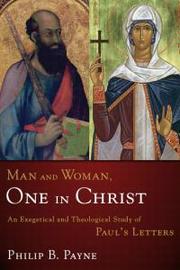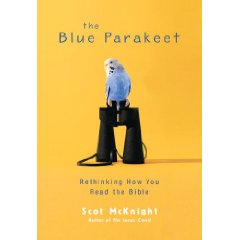What does Submit in Everything Really Mean?
- Details
- Written by: Steven R Tracy
THE NATURE AND SCOPE OF
MARITAL SUBMISSION
STEVEN R. TRACY*
I. INTRODUCTION:
WHY ANOTHER PAPER ON MARITAL SUBMISSION?
For several decades evangelicals have wrestled with the issue of gender roles, including marital submission. Thus, the
question arises: Do we really need another article on marital submission? An evaluation of the current evangelical literature
in fact reveals that very much and very little has been written.
In terms of sheer volume, hundreds of books and numerous ministries address the subject of marital submission; in that
way much has been written.2 But a closer inspection of the literature and a careful assessment of contemporary culture
reveal that very little has been written which addresses the parameters of marital submission in terms of the specific issues
that are increasingly confronting Christian women.
Read More... >>
Patriarchy & Domestic Violence
- Details
- Written by: Steven R Tracy
JETS 50/3 (September 2007) 573–94
PATRIARCHY AND DOMESTIC VIOLENCE:
CHALLENGING COMMON MISCONCEPTIONS
i. Introduction: The Significance of the Issue
In spite of significant attention given to the topic of domestic violence in
the United States in recent years, evidenced particularly by the Violence
Against Women’s Act enacted in 1994,1 domestic violence continues to be a
massive problem with enormous individual and societal consequences. The
scope and consequences of domestic violence are often misunderstood and
rarely addressed in the evangelical church, resulting in abuse victims and perpetrators
not receiving essential ministry. For instance, in Maricopa County
where I live, our community leaders conducted a survey of six hundred
women to improve services to battered women. Roughly 85% of the women
surveyed indicated that they were Christians; 57% attend church; 35% indicated
they had experienced physical abuse in a past relationship; and yet
only 7% felt they could confide in a church leader if they felt unsafe due to
their partner’s abuse.2 In another study of 1,000 battered women, 67% indicated
they attend church, one-third sought help from clergy, but of those
who sought help, two-thirds said their church leaders were not helpful.3 Thus
the evangelical church must begin to address this pressing problem.
Read More... >>
Women in the World of the Earliest Christians - Book Review
- Details
- Written by: Lynn Cohick
The passing of Mary Daly last week brought back memories of my graduate class in Feminism and Christianity. In 1984, I was in a class of about 20 women, all of whom were post-Christian (as they defined themselves). They were convinced that Christianity, and even Christ, had nothing good to say to them as women. I hoped at that time I might have the opportunity to present the early church and the New Testament with historical sensitivity. That goal takes shape as my new book, Women in the World of the Earliest Christians.
Daly's famous work, Beyond God the Father (1973), questioned basic Christian credal convictions. Over the next several decades, her work launched discussions in support of and against her conclusions. The arguments generated about the role of women in the ancient world and in the modern church have become perhaps even more heated. I find at least two basic sorts of works on women in the New Testament. One type of work is highly critical of the historical claims of the New Testament, and may dispute the very existence of a biblical figure such as Lydia. Other works swing to the opposite extreme by reading the biblical text and other contemporary texts through a naïve historical lens. This group does not wrestle with the challenges that the ancient sources present; they fail to interpret carefully the texts' rhetoric and to distinguish between prescriptive and descriptive statements.
Read more: Women in the World of the Earliest Christians - Book Review
Man And Woman, One In Christ - Book review
- Details
- Written by: Scot McKnight, North Park College, Chicago.
Man And Woman, One In Christ (Grand Rapids, Zondervan, 2009)
This book is a careful exegetical examination of Paul's teachings regarding women and their standing and ministries in the church and home. It is the condensation of 35 years of research on this topic and is full of insights that shed new light on a host of issues and correct many misconceptions. This work rigorously analyzes both the text of Paul's statements and the meaning of the text through penetrating exegetical study. It affirms the complete reliability of all of Paul's teaching.
The Blue Parakeet: A Book Review
- Details
- Written by: Christopher Appleby
The Blue Parakeet: A Book Review
 Scot McKnight's wife Kris refers to his latest book, The Blue Parakeet, as “one of his readable ones.” The book is, in fact, one of his most readable, which is most fortunate given the importance of the subject matter. Although Scot McKnight is something of an avid birder, the book's title is really only a metaphor, not a literal description of the subject at hand. For that, the books subtitle, “Rethinking How You Read the Bible” sums it up. And if you notice that the image of the book cover glows just a little, it's no accident - the book deserves a glowing review.
Scot McKnight's wife Kris refers to his latest book, The Blue Parakeet, as “one of his readable ones.” The book is, in fact, one of his most readable, which is most fortunate given the importance of the subject matter. Although Scot McKnight is something of an avid birder, the book's title is really only a metaphor, not a literal description of the subject at hand. For that, the books subtitle, “Rethinking How You Read the Bible” sums it up. And if you notice that the image of the book cover glows just a little, it's no accident - the book deserves a glowing review.
Half the Sky: A Must-Read Book
- Details
- Written by: Carolyn McCulley
Half the Sky: A Must-Read Book (From Christianity today)
The fight for women's dignity worldwide, the 'cause of our time,' needs Christians now more than ever.
This past weekend, The New York Times Sunday Magazine devoted its entire issue to "Why Women's Rights Are the Cause of Our Time." Some very sober and powerful reading there — and not what you might think upon encountering a magazine with a title like that. In fact, these are real, global, and serious issues that should have the attention and ministry of Christians everywhere. More on that in a moment.
The lead feature was an excerpt from the forthcoming book by New York Times columnist Nicholas Kristof and his wife, Sheryl WuDunn,a former Times correspondent who now works in finance and philanthropy. Here's a summary of the book, titled Half the Sky: Turning Oppression Into Opportunity for Women Worldwide — one that includes an honest fact about abortion that I was stunned to read in a mainstream publication. This is a good indicator of the journalistic veracity of this book's research:
The great error of history
- Details
- Written by: Mimi Haddad
The great error of history
"So God created human beings in his own image, in the image of God he created them; male and female he created them"(Genesis 1:27, TNIV).
A noted church historian once observed that the great error of history is presumption-presuming that one has grasped the necessary facts related to a person, a group or situation when in reality one is largely uninformed. Perhaps you can recall a time in your own life when presumption led you into deep waters. I certainly can.
Some of the deepest waters in American history are the result of acting on presumptions rather than facts. Consider the presumption that created and legitimized American slavery. Slavery in the US was based on the mistaken belief that Africans as an ethnic group were inferior. In his towering book, The Civil War as a Theological Crisis, historian Mark Noll said that “so seriously fixed in the minds of white Americans, including most abolitionists, was the certainty of black racial inferiority that it overwhelmed biblical testimony about race, even though most Protestant Americans claimed that Scripture was in fact their supreme authority in adjudicating such matters” (Noll p. 73).

